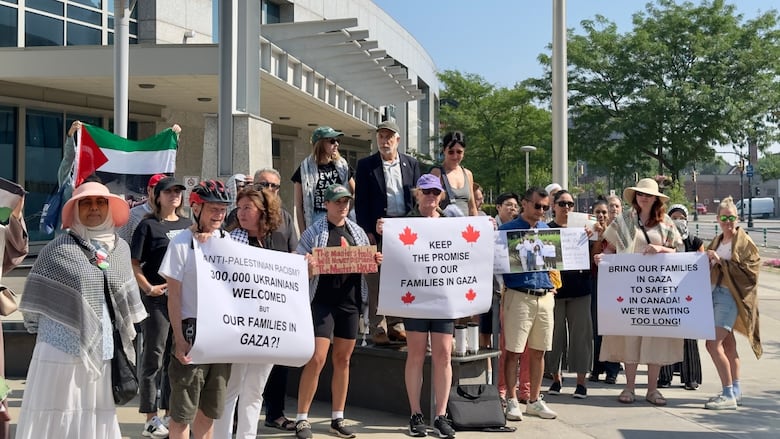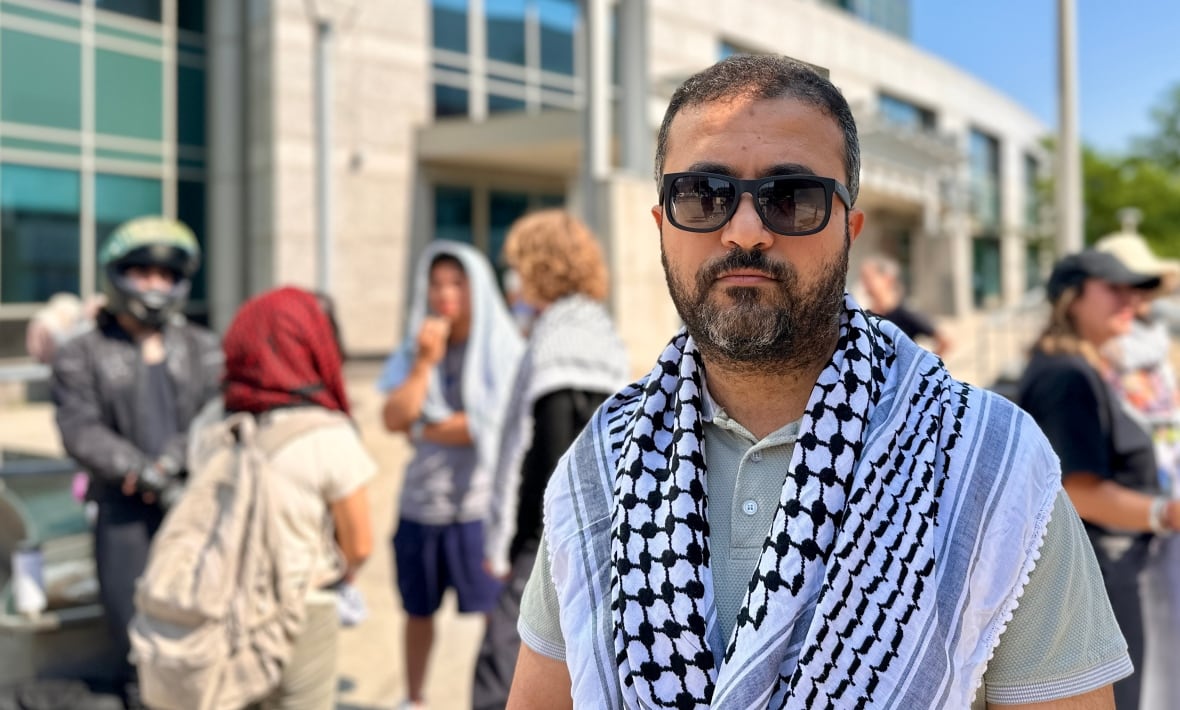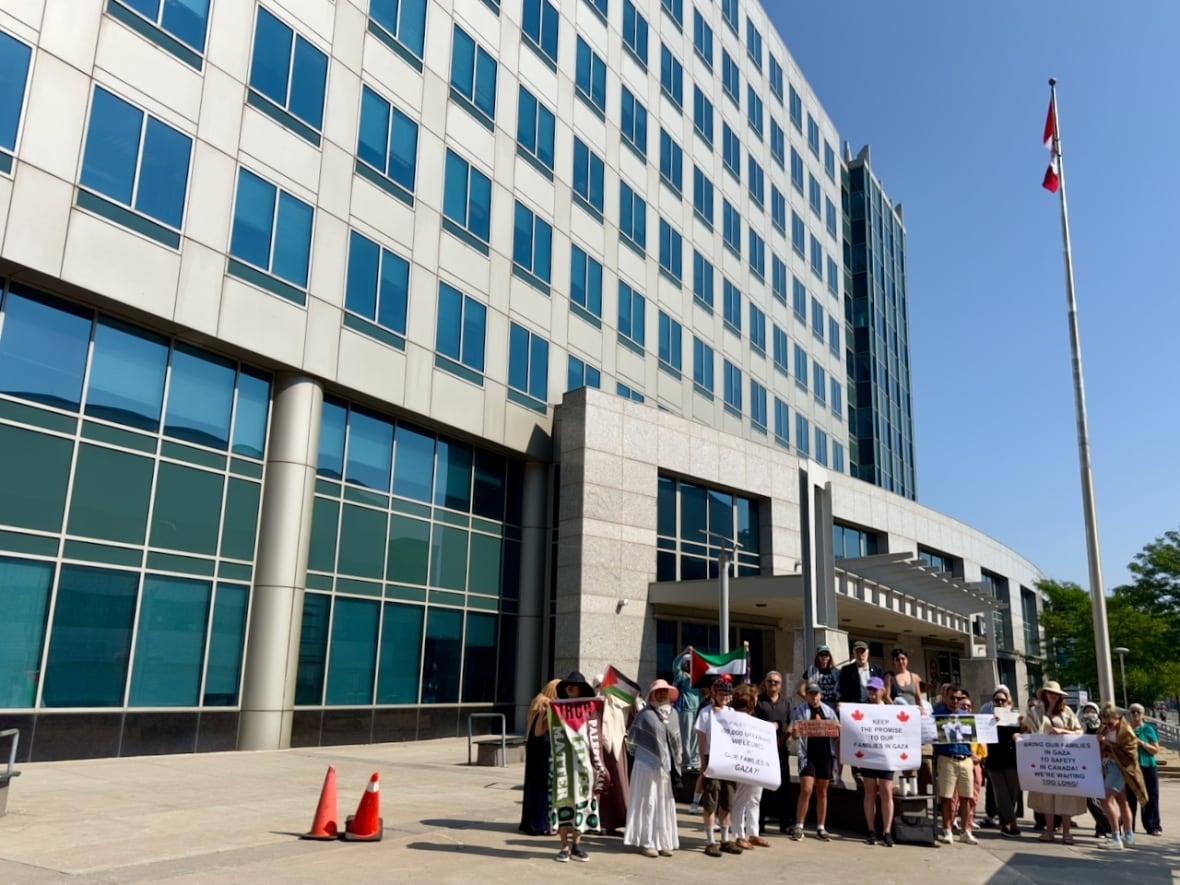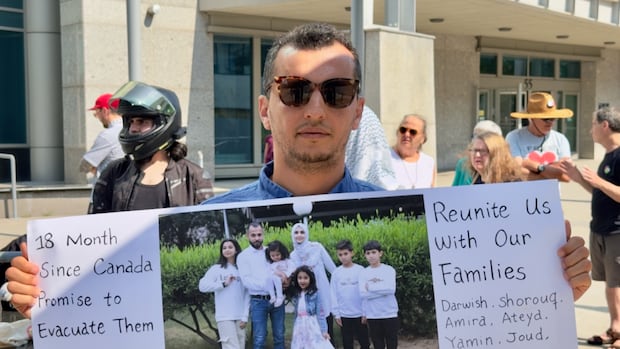Hamiltonians call on Canada to speed up Palestinian family reunification
Several demonstrations in Canada this week called for action

When Mahmoud Fares calls his family in Gaza, "I don't even have the guts to ask them, 'How are you doing?'" he says. "We know how they are doing. They're doing bad."
The Hamilton man said he has 16 family members — 10 of them children — in the war-torn region, including his elderly parents, who he said have diabetes and high blood pressure. He said they lack reliable access to food, water and electricity.
Due to the territory's unsafe conditions, he's been trying to bring them to Canada under this country's special reunification measures for people with family in Gaza, Fares told CBC Hamilton.
He said he applied for them all to get temporary resident visas and all passed the criteria. Some have passed background checks but none have been evacuated, he said. "I worry for them every day and I hope Canada will keep its promise to evacuate them as soon as possible."

Fares was one of two family members of Gazans who spoke to CBC Hamilton during a demonstration outside the Immigration, Refugees and Citizenship Canada (IRCC) office in downtown Hamilton Tuesday. The gathering was one of multiple rallies throughout the country calling on the government to speed up its reunification efforts.
Rani Hemaid is a Palestinian-Canadian who also shared his story.
He has has been speaking out about efforts to reunite his family and calling for change since the start of the latest war, which began with a Hamas-led attack on Israel on Oct. 7, 2023, that killed about 1,200 Israelis and led to about 250 people being taken hostage in Gaza, according to Israeli tallies.
Israel's subsequent military offensive has killed more than 58,400 Palestinians, mostly women and children, and wounded more than 139,000 others, according to Gaza's Health Ministry.
Hemaid's parents fled the war and arrived in Canada through IRCC's resettlement program in May 2024, nearly half a year after Hemaid applied to the Canadian government to bring them here. He said his brother's family was also able to get out of Gaza and come to Canada.
But almost 18 months after he applied to get his sister, her partner and their five children to Canada, Hemaid says he's still waiting to learn if they can come.
On Wednesday, he told CBC Hamilton he had just spoken with his sister.
"She said she dies every day a thousand times seeing her children might die from starvation, from lack of medical treatment, from bombs. She suffers the pain of seeing them not being able to act like children," said Hemaid, who came to Canada in 2014.
Canadian government says it can't control who leaves Gaza
Initially, Canada's special reunification program accepted 1,000 temporary resident visa applicants, but in May 2024, then-immigration minister Marc Miller announced the cap would expand to 5,000. As of March this year, IRCC says, the agency reached that cap.
Applicants need to meet eligibility requirements and undergo security screenings conducted by agencies outside IRCC, agency spokesperson Julie Lafortune told CBC Hamilton in an email. Therefore, she said, IRCC is unable to provide average processing times.
"Movement out of Gaza remains the biggest challenge affecting how quickly we can help Gazans reunite with their family in Canada," Lafortune said, adding necessary biometric submissions can only be completed after people leave Gaza.
She said Canada continues to share names of people who passed preliminary screening with local officials but does not decide who can leave.
As of July 8, IRCC says more than 1,750 people who exited Gaza and passed security screenings have been approved to come to Canada. Of those, 864 people have arrived in Canada from Gaza on temporary resident visas.
"IRCC will continue processing applications under the special pathway on a priority basis. We continue working closely with local authorities — at every level — to facilitate the exit of people in Gaza and to advocate for their safety," Lafortune said.
"That's the easy answer for the Canadian government since the start of this conflict," Hemaid said, adding he thinks there's more the government could do.

On Wednesday, Omar Omar, founder of the group Gazan Canadian Families, told CBC Radio's The Current that he organized demonstrations across Canada because he's unhappy with the pace of the program.
He said he doesn't believe Canada did much, if anything, to help the people IRCC says came here using its program. It's more likely people paid smugglers to take them out of Gaza and into Egypt, he said.
Debbie Rachlis, an immigration lawyer working with Palestinian Canadians and their families agrees. She and Omar told The Current other countries have been more successful helping people get out of Gaza. Rachlis added Canada should assert more pressure.
Rachlis is part of a group who filed a case against the federal government on behalf of 53 people inside Gaza over the delays in processing visa applications. She called Canada's program "needlessly complicated" and a "disaster."
Rachlis said her team wants their clients to come to Canada, and an explanation for what went wrong.
Canadians have responsibility to aid Gazans, says demonstrator
The Hamilton demonstration saw about 30 people gather outside the IRCC office. Some were from the group Independent Jewish Voices, others attended independently.

One of them was Nina Karachi-Khaled of the Canadian Council of Muslim Women. The Burlington woman told CBC Hamilton she's a friend of Hemaid who wants Canada to do more for Palestinians. "
The inhumanity, the destruction, the hopelessness that we all feel watching what's going on in Gaza is beyond belief."
"We are in a position of privilege and we have to understand that with privilege comes responsibility," Karachi-Khaled said. "We who have so much need to give back, need to speak up for those that have no voice and the ones that are being silenced."
Fares and Hemaid both said they've tried to contact Immigration Minister Lena Diab to discuss family reunification, but haven't heard back.
CBC Hamilton asked IRCC if Diab would be open to meeting with people in their situations but it did not respond.
If he could speak with officials, Fares said he'd ask them to "look at the humanitarian side of things."
"I want them to understand that every minute that passes, I could lose my sister and her kids," Hemaid said. "They need to act now, not tomorrow."
With files from The Associated Press, The Current and CBC News


